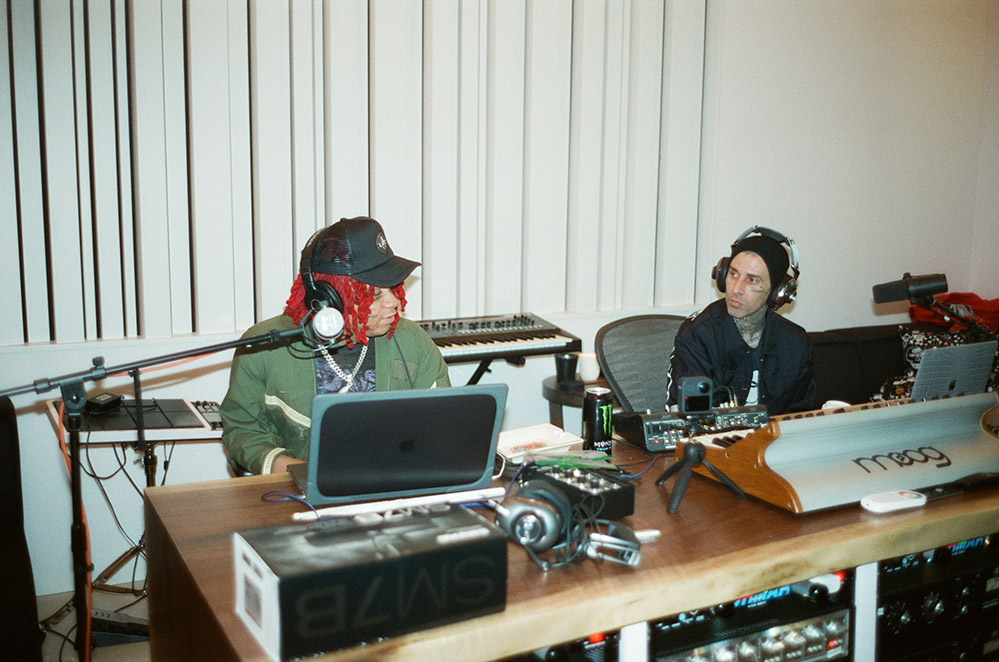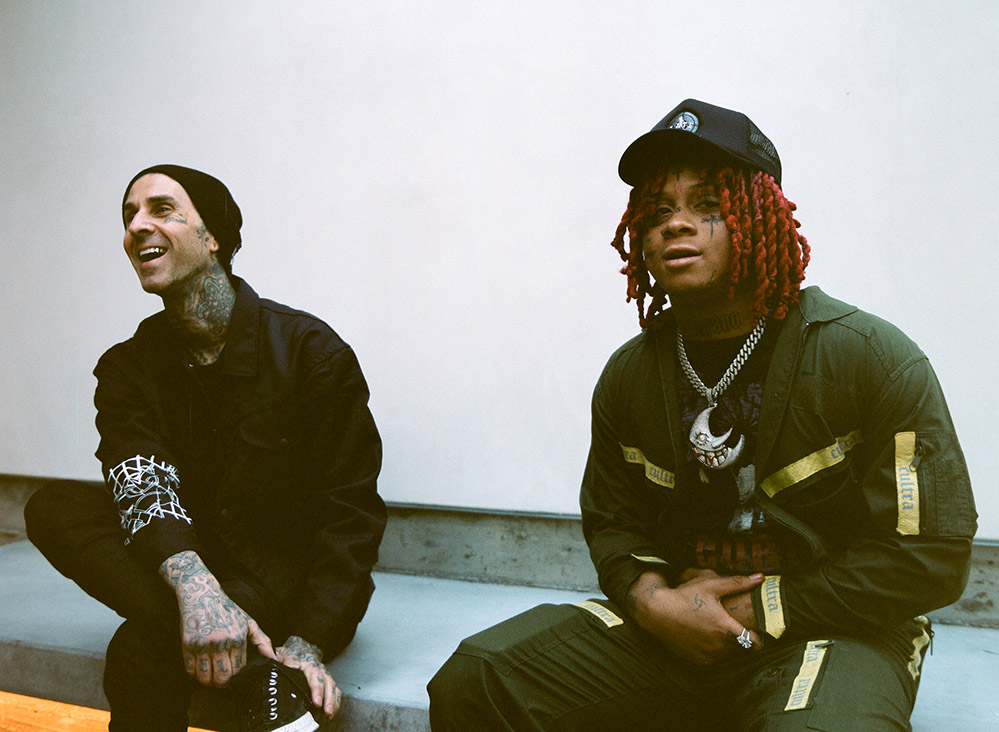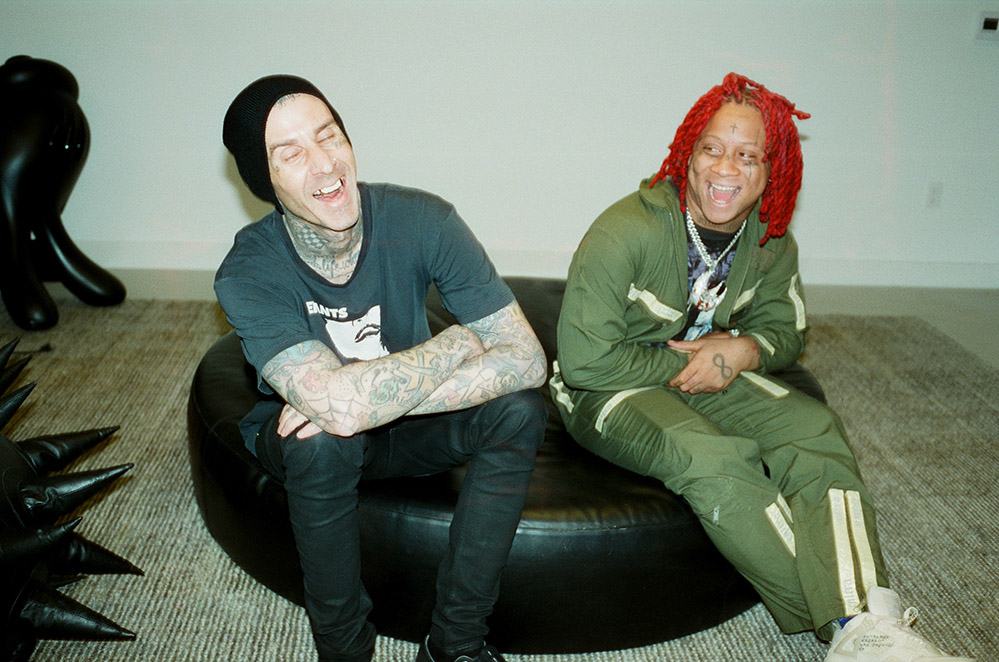Erica Hernandez*
Sose Fuamoli talks to both Trippie Redd and Travis Barker about how they created one of the most innovative and versatile albums of the year.
In the years since he’s become a vital part of the hip-hop scene, Trippie Redd has become renowned for being as unpredictable as he is prolific, and as versatile as he is adventurous. A genre-shifting musical chameleon, it shouldn’t exactly have come as a surprise that the 21-year-old makes his first venture into the rock genre by way of his latest record, NEON SHARK.
To be fair, Neon Shark isn’t exactly a new record in the traditional sense, namely due to the fact it effectively serves as a deluxe reissue of his Pegasus album, which arrived last October. Officially titled NEON SHARK vs. Pegasus [Deluxe – Presented by Travis Barker], the 14-track release sees Trippie fully embracing the rock and pop genres, recruiting the likes of Scarlxrd, Zillakami, blackbear, Machine Gun Kelly, and Deftones’ Chino Moreno to curate a record that features a sound so unique it couldn’t have been made by anyone else.
While NEON SHARK bears the Trippie Redd name front and centre, it’s the talents of Blink-182 drummer Travis Barker that help Trippie realise his potential. Working with the punk icon to create one of the boldest and most innovative releases of his career, NEON SHARK is a major release in both the world of hip-hop and rock.
In anticipation of the record’s release, Sose Fuamoli sat down with the pair for an in-depth interview to discuss how the two acclaimed artists got together, how such an album came about, and what’s still to come.
How did you guys first link up and where did the genesis of the project begin?
Trippie Redd: I had FaceTimed [Travis] and told him I wanted to work, and he was excited to do it. So, he sent me over some stuff and I called him back two hours later, with like four songs. Then when he heard those and we were excited about them, we just got really, really into making the album. He sent more vibes over and we ended linking up, he wanted even more songs.
What was it like for you Travis? You’ve had your ear in the hip-hop game for many years now, so what was it like jumping into the studio with Trippie for the first time?
Travis Barker: It was cool, from the first time we talked over FaceTime, I think it was the next day I sent him a couple ideas and then a few hours later he sent me vocal ideas with melodies and lyrics already. It was like how I like to work, I’m impatient, I like to move fast, I like to be creative and productive, and he was the same way.
Then we had a lot of the same things in common, as far as influences, from what he was inspired by like Nirvana or Deftones, Blink or Green Day. He had influences within the genre which I guess I’m best known for. And, I had seen Trippie before, I had witnessed him basically cut all the music and singing acapella for an entire set, so I knew I was going to be able to make something awesome with him in a different genre because he could sing, he had great melody, great pitch, he was a star. So, it was easy, it was fun.

(Photo by Erica Hernandez)
When you were doing sessions with each other, was there anything about the way the other person worked that jumped out as a surprise or highlight that you weren’t expecting?
TB: I think we were just quick, whether I was sending him music or he was sending me ideas back immediately, hours later. He’d be like, “I just cut on all four of those ideas and I’m gonna send them”. Literally, that’s how the album came about. We’d go months without talking because both of us were touring or doing whatever, but then when we’d link back up, we’d make a few more records here and there.
TR: And he’d been getting back in the studio after I complete the songs. Seeing him drum to the song and add stuff to it. As far as the drumming, it was just fire. I never seen nobody play the way he plays.
That’s been the dope thing having been a fan of both genres from the jump. You put punk drummers, rock drummers, especially into live hip-hop settings and it just elevates things so much, because I feel like there such a tight relationship between the two. What makes the more rock influences bleed in so well with hip-hop too.
I feel like while there might be a lot of younger fans who might be like “Travis Barker is on this record with MGK or on this record with Trippie Redd”, it makes so much sense. The connections have always been there, I feel like in terms of collaboration, it’s maybe one of the most organic and most natural that you can have.
TR: Also, fun fact, rock was created by a person of colour. The whole genre was made by a person of colour. Hip-hop, same vibes. It all correlates from the same type of thing, same stuff.
For you two as creatives, I wanted you to chop it up a bit about how having the ability to still work through this pandemic has gotten you through the last year. Has there been anything about this record in particular that stood out as significant as getting you through?
TR: I honestly feel like if it wasn’t for the pandemic happening, I ain’t gonna lie, I probably would’ve rushed Neon Shark further than what I got now. Now I got stuff on the album that wouldn’t have been on the album before, it wouldn’t have been the same, it would’ve been less songs.
TB: We wouldn’t have been home to get in the studio. I think he’s been wanting to put it out for a while now and we had records, I was like “let’s get in one more time and see what happens”. During probably the first part of the album, we were never in the studio together.
So, actually, being able to finish a record and play something and be like “do you like this”, go in and mess with it, and he’d come back the next day and I would’ve created a bridge for it and put new drums on it and added another part. Being able to be in the same room during this last time has been great. Obviously, the pandemic sucks, and people getting sick sucks, but it’s been a blessing for us to be creative.
TR: Yeh just working with the sounds, figuring out your voice and having enough time.
Were either of you surprised at how naturally everyone fit in on the record in the end when you listen to it as a whole package?
TR: Not really because that’s like my main thing, I always try to make shit sonically sound amazing. And he’s the same way, so we’re perfectionists when it comes to making stuff sound perfect. When it came down to all the different songs and how they felt and putting them together, it’s like a rollercoaster, there are different ups and downs and it’s just fire.
You’ve said in the past artists like Lil Wayne were an inspiration in terms of their versatility they brought to the game. Now I feel like, with this sort of work in particular, you are kind of elevating yourself.
For a lot of fans, you’re now their Lil Wayne. How does releasing expansive projects like this, how does this make you feel, still as a young artist, developing and really pushing your unique identify forward?
TR: It feels good cause I watched him do it, so to be able to do it myself and finish it on my own terms and my own thoughts, and just adding my favourite people in rock into to it, too – it’s a no brainer, and I feel like it’s just crazy. I know my fans are gonna love it. I like how you said “I’m making myself like their Lil Wayne”, that’s the whole purpose of it.
Travis from your perspective, you’ve been in the game a minute now and you’ve worked with a lot of these artists as well, so seeing the likes of Trippie not only coming through and carving out his own lane but being able to be a part of that for a new generation of artists and fans, what’s that been like for you?
TB: It’s amazing. I was with Wayne, I toured with him. Like I said, from the moment I saw Trip, I feel like Trip, X, and MGK are those three artists that can actually make real rock projects. I didn’t know we were going to work together, but from the first time I saw him perform when he did the majority of his set acapella, I knew.
And just from his own catalogue of music before this rock project was versatile. There are hard records, rage records, love songs, you know what I mean? He takes you everywhere already, so I knew with the rock project and how much he knew about rock music, that he could do the same thing in that genre.

(Photo by Erica Hernandez)
I feel like there is a legion of hip hop fans that are connecting with their emotions in a deeper way, and it’s because of people like you, X, Juice WLRD, even The Kid LAROI, you are kind of taking that mantle up and I feel like it’s really cool to see younger fans engaging in a way that isn’t superficial, there is definitely depth in this music and there’s something real there. So, you’re at the centre of this change, that’s gotta be a cool vibe for you to be a part of Trippie, but for you too Travis because you’ve been doing it.
TB: Yeah, I only work with people I like, too. Even if I wasn’t sitting here with Trippie, I’m a big fan of his music. I was listening to all his albums. He does make heartfelt music, it’s not just some words on a record, or some hit songs. They mean something. I think I connected to that right away, like the same way I did with X and why I worked with X and I liked working with him, very similar.
Is it a goal of you guys to tour together and bring this into a live arena if possible?
TR: If he goes on tour, I’m gonna go with him.
TB: Yeah, if the universe allows it, then definitely.

(Photo by Erica Hernandez)
The record feels like a real live record already, there’s something in the way of your delivery and musicality, you can just see it popping off live.
TB: The majority of it [the album] is live instruments, there are only a couple of songs with track drums or little pieces of it mixed in, but it’s a real rock album. It’s not just guitar over trap beats, we went all the way in.
How has working together reinforced your love for collaboration, or has it given you something to move into other collaborations or to further explore?
TR: I like taking that extra mile and working, putting things together in the studio, just doing everything extra after the vocals. I feel like I’ve been doing that ever since, me and him were too, it just feels a lot better.
TB: Collaborating is like being in a band, it’s cool. I would rather collaborate and make music with somebody than just all by myself, and, just mix in our two worlds. It’s exciting.
Trippie Redd’s Neon Shark is out now via 10K Projects/Caroline Australia.







































